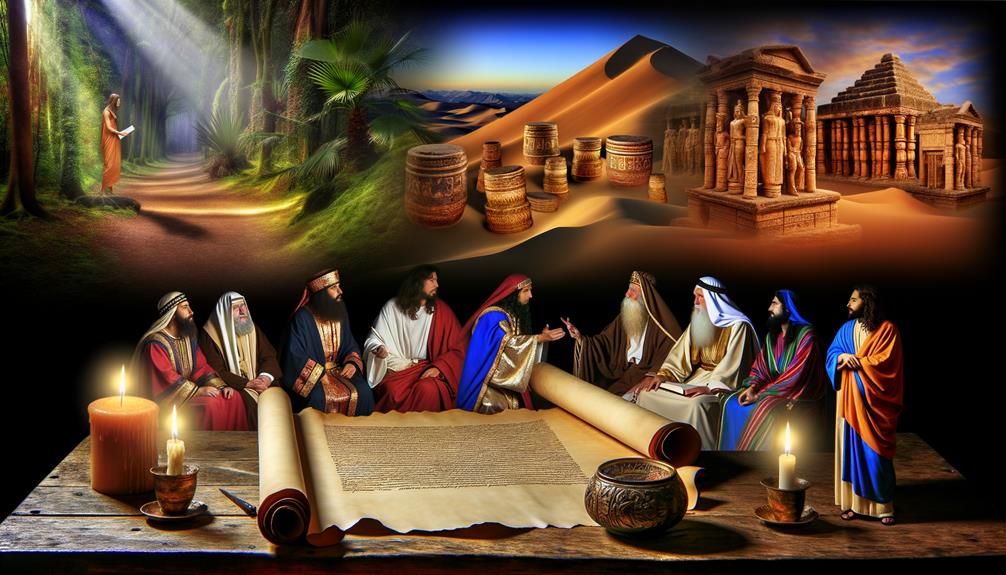Durst Meaning In The Bible: Boldness and Fear
In biblical texts, the term ‘durst‘ is an archaic form of ‘dare,’ signifying acts of courage or boldness often juxtaposed against divine commands or moral imperatives. Emerging from Old English, its usage in scripture such as Daniel 3:18 and Acts 7:32 highlights moments where human agency confronts divine authority.
This term encapsulates the tension between audacity and reverence, shaping narratives that underscore moral courage and divine interaction. The historical and etymological roots of ‘durst’ enrich its theological significance, providing a deeper understanding of biblical language and encouraging deeper engagement with the complexities of scriptural interpretation.

Durst Meaning in the Bible: Definition and Scriptural Context
| Aspect | Description |
|---|---|
| Word Definition | “Durst” is an archaic form of “dare,” meaning to have the courage to do something |
| Common Usage | Found in older Bible translations like the King James Version |
| Example Scripture | Mark 12:34 – “And no man after that durst ask him any question.” |
| Contextual Meaning | Often implies fear, hesitation, or lack of courage to act or speak |
| Spiritual Insight | Reflects human reverence or fear in the presence of divine authority |
| Modern Equivalent | “Dared” or “was bold enough” |
Definition of ‘Durst’

The term ‘durst’ is an archaic form of the verb ‘dare,’ frequently encountered in biblical texts, embodying a sense of courage or boldness in the face of divine or moral imperatives.
Scripturally, it signifies the audacity or resolve required to act against overwhelming odds or in defiance of societal norms, often underpinned by a profound faith in divine support.
For instance, in the King James Bible, ‘durst’ is used to depict moments where individuals take decisive actions inspired by divine command or ethical conviction.
This term illuminates the theological narrative of human agency intertwined with divine will, reflecting the historical context where moral fortitude was indispensable for fulfilling divine mandates.
Consequently, ‘durst’ encapsulates a pivotal aspect of biblical exhortation toward righteousness.
Origins and Etymology

The term ‘durst,’ an archaic form of ‘dare,’ originates from Old English and possesses significant linguistic roots that trace back to the Germanic languages.
In the biblical context, its usage reflects the semantic evolution from early scriptural translations to the King James Version.
Understanding this term’s historical and etymological background enriches our comprehension of its theological implications within the sacred texts.
Historical Linguistic Roots
Tracing the origins of the term ‘durst’ within the biblical context reveals its etymological roots in Old English and its subsequent evolution through various linguistic stages.
The term ‘durst,’ a past tense of ‘dare,’ finds its initial usage in:
- Old English (circa 450-1150 AD): Derived from the Old English word ‘dearr,’ the term denotes boldness or courage, often employed in religious texts to signify moral fortitude.
- Middle English (1150-1500 AD): Shifting into ‘dorste’ or ‘durste,’ the term retained its thematic essence but began to embody a more archaic form.
- Early Modern English (1500-1700 AD): The period saw ‘durst’ solidified in scriptural translations like the King James Bible, reflecting an evolving yet consistent theological vocabulary.
This historical journey underscores the term’s enduring significance in biblical exegesis.
Biblical Language Context
In examining the biblical language context, ‘durst‘ emerges as a term intricately woven into the fabric of scriptural narrative, reflecting an intricate blend of etymological evolution and theological import.
Rooted in Middle English, ‘durst’ is the archaic past tense of ‘dare,’ connoting courage, boldness, or audacity. Its use in the Bible, particularly in the King James Version, often underscores moments of divine confrontation or human temerity in the face of spiritual authority.
For example, in Daniel 3:18, the term illustrates the audacious faith of Shadrach, Meshach, and Abednego.
The term’s etymology, tracing back to its Anglo-Saxon origins, reveals its enduring resonance in conveying the profound dynamics of bravery and reverence within the sacred text.
Semantic Evolution Over Time
Etymological development of ‘durst’ reveals its profound linguistic journey from ancient Anglo-Saxon roots to its nuanced application in biblical texts. Originating from the Old English verb ‘durran,’ meaning ‘to dare,’ the term ‘durst’ evolved considerably over centuries.
Its transformation within scriptural contexts underscores:
- Historical Linguistics: The change from Old English ‘durran’ to Middle English ‘dursten’ exemplifies the dynamic nature of language, influenced by socio-political changes.
- Biblical Usage: In scripture, ‘durst’ is often employed to convey a sense of reverence or awe, reflecting cultural attitudes towards divine authority.
- Theological Implications: The term’s evolution highlights shifts in theological interpretation, where daring is seen not merely as boldness but as a nuanced expression of faith and fear before the sacred.
This semantic evolution enriches our understanding of biblical language.
‘Durst’ in Old Testament

Frequently appearing in the Old Scripture, the term ‘durst‘ is utilized to convey instances of fear, reverence, or hesitation among biblical figures. This archaic verb, often translated from Hebrew texts, encapsulates moments where individuals approach divine commands or celestial encounters with caution.
For instance, in the presence of the Almighty, characters such as Moses and the prophets exhibit a profound sense of awe and trepidation, encapsulated by the term ‘durst.’
Historical context reveals an environment where divine interaction was perceived as both majestic and terrifying. Consequently, ‘durst’ signifies not merely fear but an acknowledgment of the overwhelming power and sanctity of God, integral to understanding Old Covenant narratives and the human response to the divine presence.
‘Durst’ in New Testament

The New Covenant’s use of the term ‘durst’ reflects a continuation of its Old Covenant connotations, revealing moments where figures like the apostles exhibit reverential fear and hesitation in the face of divine authority and miraculous events.
This term underscores the profound respect and awe experienced by early Christians.
Key instances include:
- Acts 5:13 – Early believers did not dare to associate closely with the apostles due to the palpable presence of divine power.
- Mark 12:34 – Questioners of Jesus refrained from further interrogation, recognizing His unparalleled wisdom.
- John 21:12 – The disciples, encountering the resurrected Christ, dared not question His identity, overwhelmed by His divine presence.
These occurrences highlight the reverence and trepidation intrinsic to encountering the divine in the New Scripture.
Contextual Examples

To understand the multifaceted implications of ‘durst’ in biblical texts, it is essential to examine specific scriptural references where this term is employed.
By analyzing passages such as John 21:12 and Acts 7:32, we can uncover the interpretative nuances and theological significance embedded within these contexts.
This exploration not only illuminates the term’s meaning but also enriches our comprehension of its historical and doctrinal layers.
Biblical Text References
In examining the term ‘durst’ within biblical scripture, one encounters various passages that illuminate its usage and contextual significance. This archaic form of ‘dare’ often appears in moments of significant decision or divine interaction, enriching the text’s theological narrative.
Notable references include:
- Daniel 3:18 – The term is used in the context of Shadrach, Meshach, and Abednego’s defiance before King Nebuchadnezzar, emphasizing their unwavering faith.
- Acts 7:32 – In Stephen’s speech, ‘durst’ signifies Moses’ initial fear and hesitation upon encountering the burning bush.
- Hebrews 11:23 – The term highlights the courage of Moses’ parents in defying the king’s edict, showcasing their faith-driven boldness.
These examples provide a deepened understanding of ‘durst’ in the biblical texts.
Interpretations and Meanings
Understanding the term ‘durst‘ within its scriptural context requires a nuanced examination of its implications in moments of faith, fear, and divine confrontation.
In the Bible, ‘durst’—an archaic form of ‘dare’—often appears in narratives where human boldness or hesitation is highlighted. For instance, in the Book of Daniel, it is employed to depict the audacity of those who challenge divine authority, contrasting with the reverent fear of faithful believers.
Similarly, in the Gospels, ‘durst’ underscores the trepidation of individuals confronting the supernatural presence of Christ.
Historically, this term encapsulates the tension between human courage and divine reverence, inviting readers to reflect on their own spiritual boldness or reticence in the presence of the divine.
Modern Relevance

How does the term ‘durst,’ an archaic word found in biblical texts, maintain its significance in contemporary theological discourse and scriptural analysis? The word ‘durst,’ meaning ‘dared,’ offers enduring relevance through its exploration of human courage and divine command, reflecting timeless spiritual themes.
- Theological Symbolism: ‘Durst’ encapsulates the human struggle to align personal bravery with divine will, resonating with believers maneuvering moral challenges.
- Scriptural Integrity: Maintaining archaic terms like ‘durst’ preserves the historical and literary authenticity of biblical translations, fostering deeper scriptural engagement.
- Educational Value: Understanding ‘durst’ enriches one’s grasp of biblical language and its evolution, enhancing theological education and scriptural literacy.
Conclusion
In the intricate tapestry of biblical language, ‘durst’ emerges as a relic of linguistic antiquity, symbolizing human hesitance before divine encounters.
Its origins rooted in Old English, ‘durst’ weaves through the fabric of both Covenants, providing profound insights into the existential struggles of biblical characters.
As the sands of time shift, understanding ‘durst’ invites modern readers to reflect on their own spiritual audacity and reverence, bridging ancient scriptural wisdom with contemporary faith experiences.






